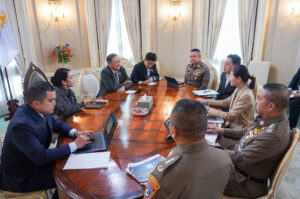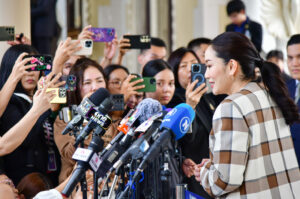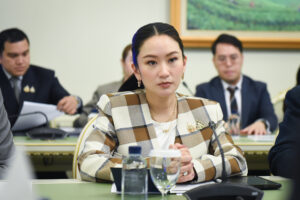แถลงการณ์พรรคเพื่อไทย เรื่องไม่รับร่างรัฐธรรมนูญ ที่ไม่ยอมรับอำนาจของประชาชน
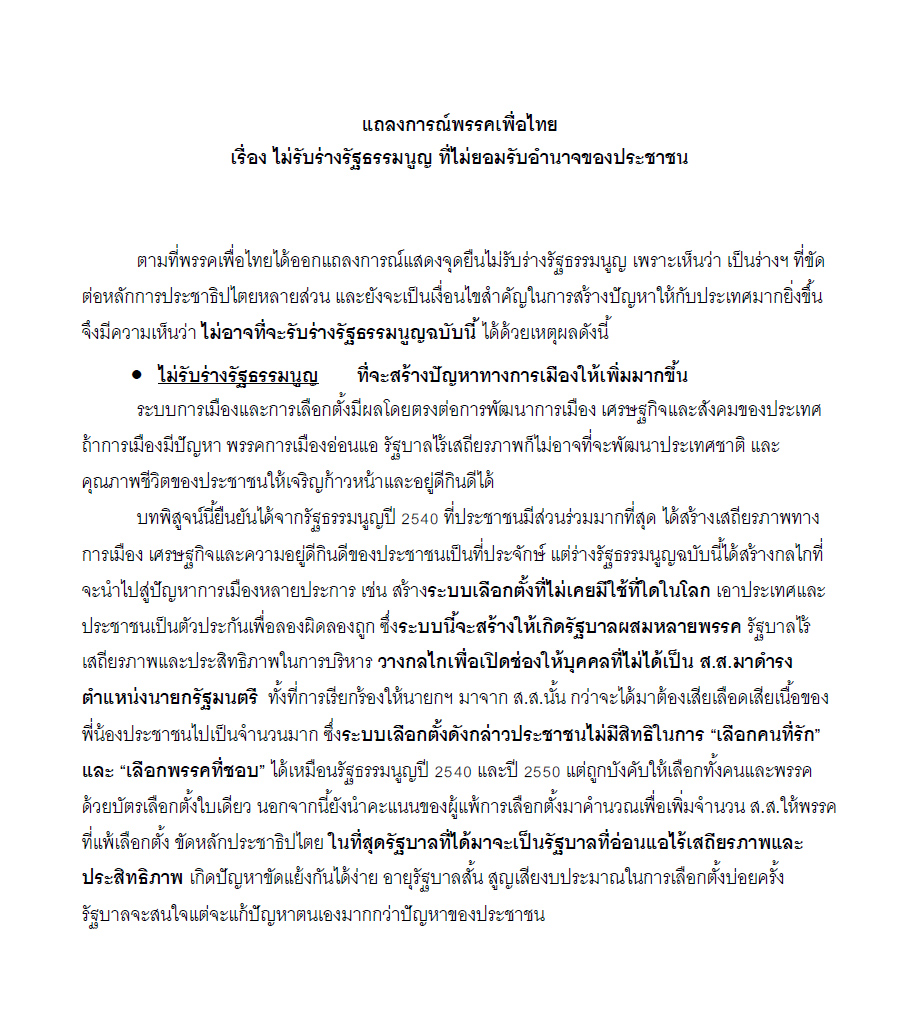
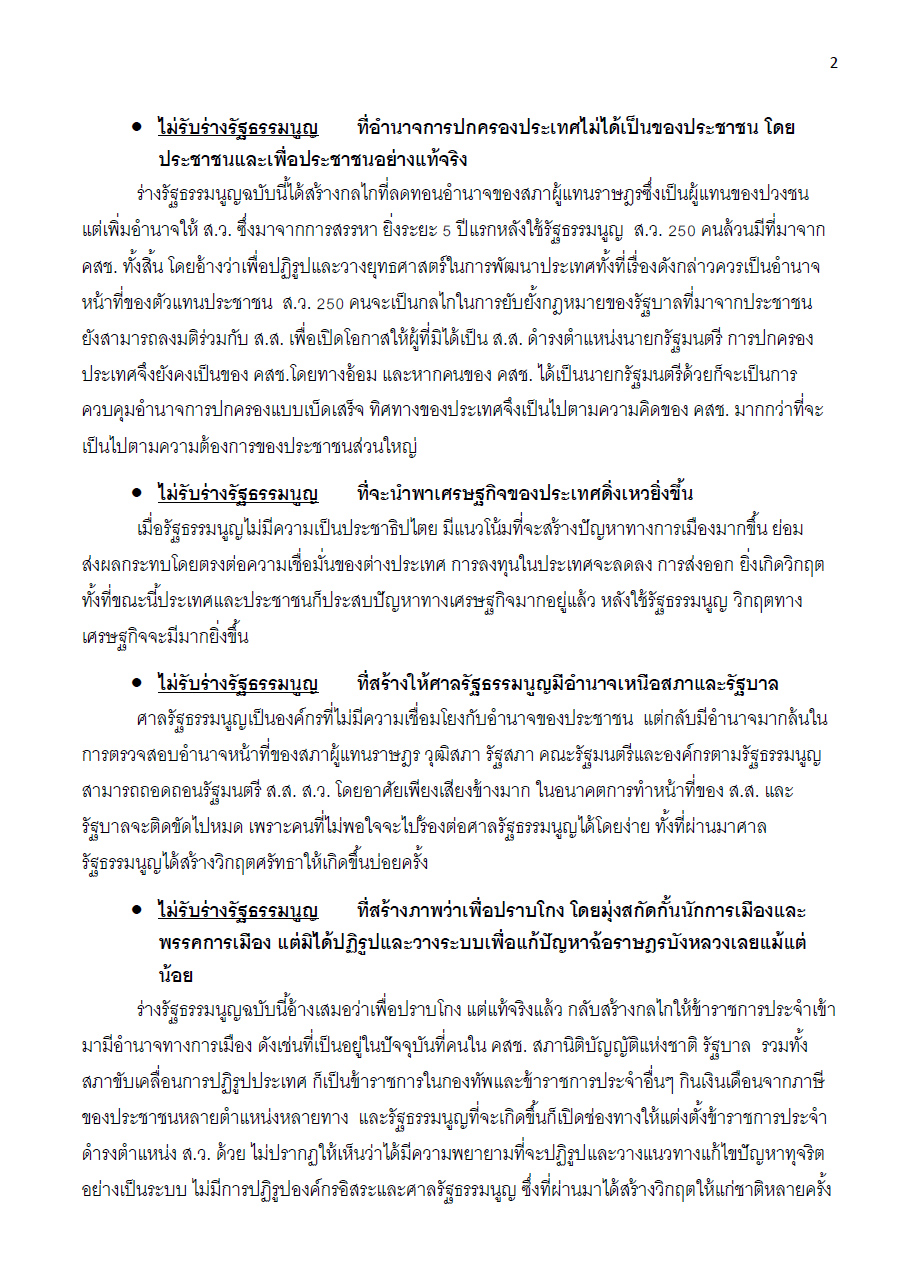
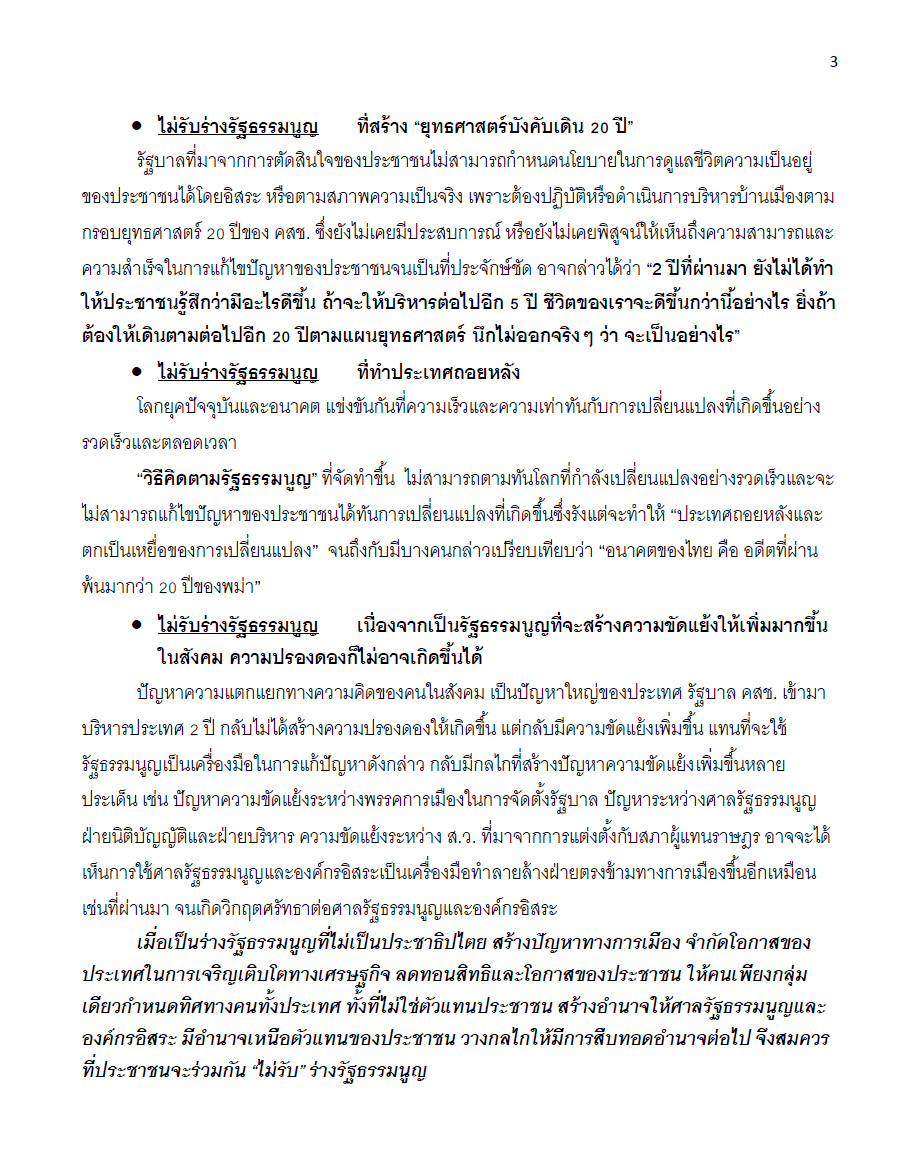
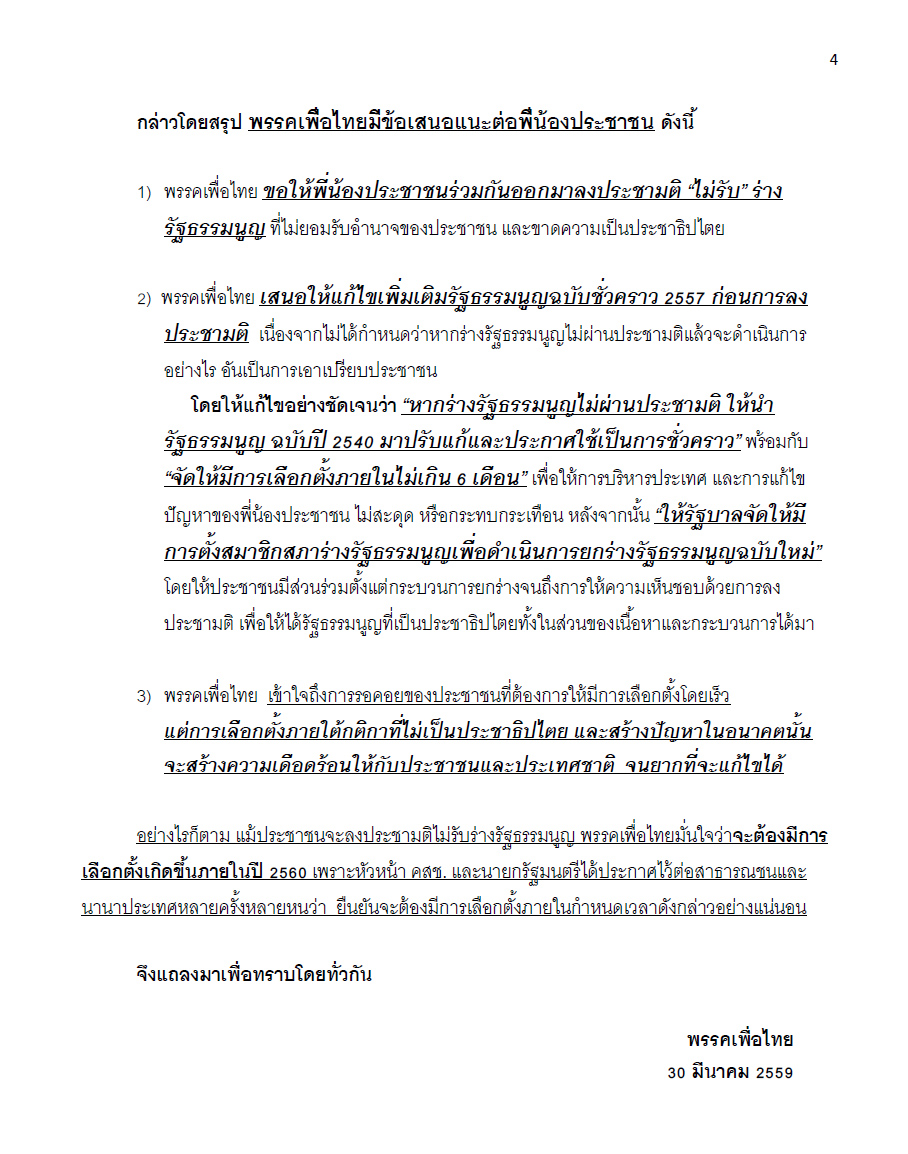
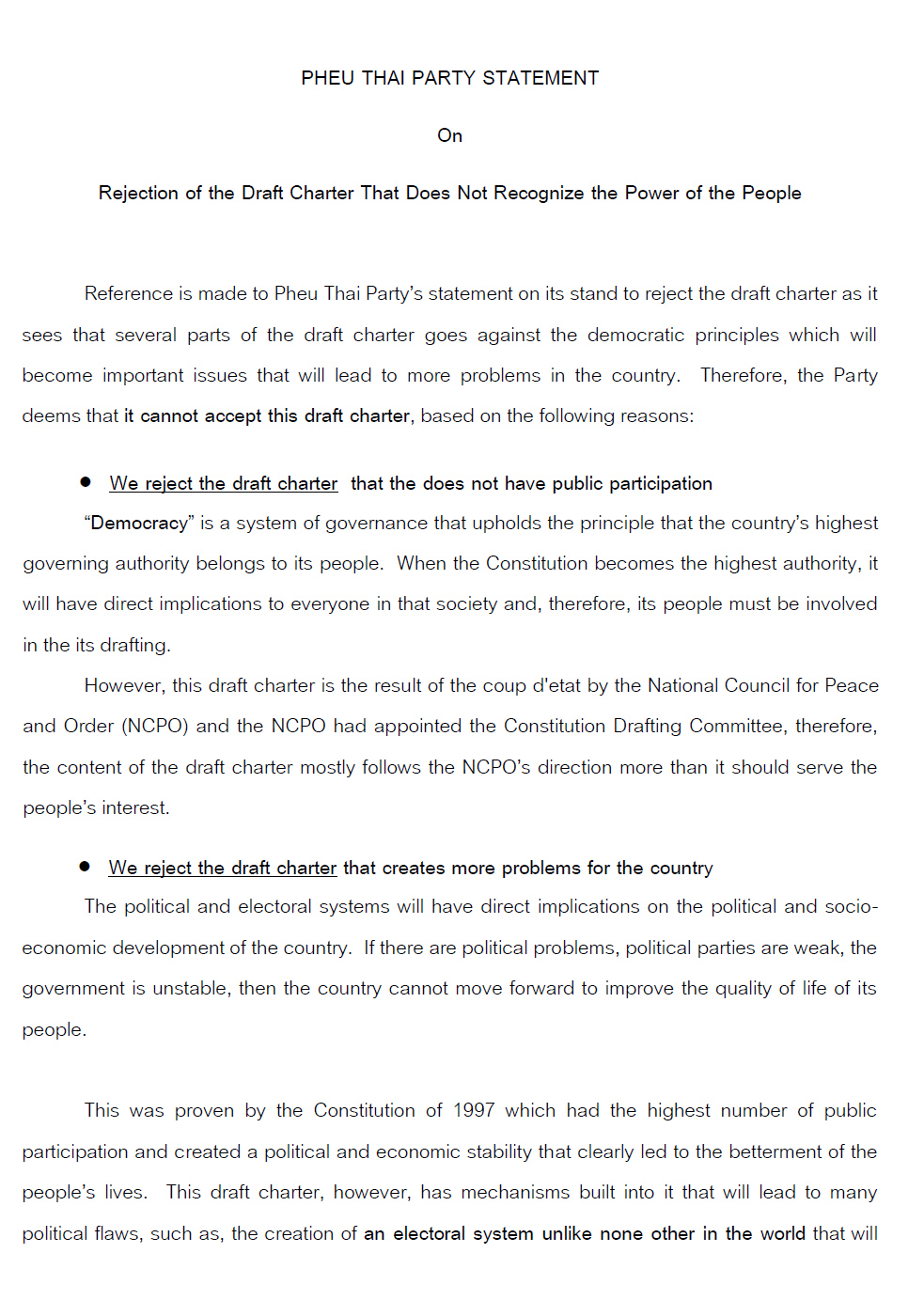
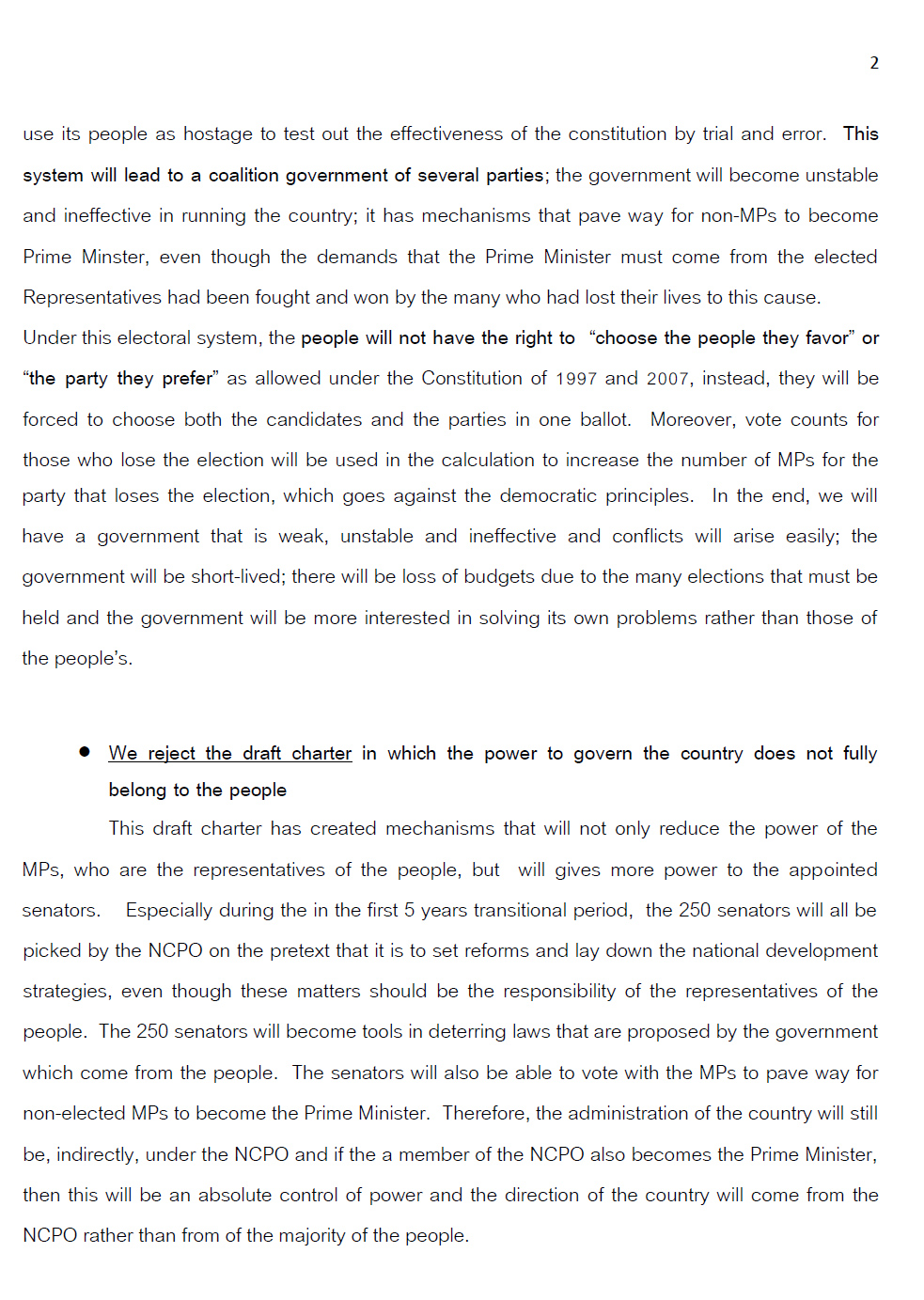
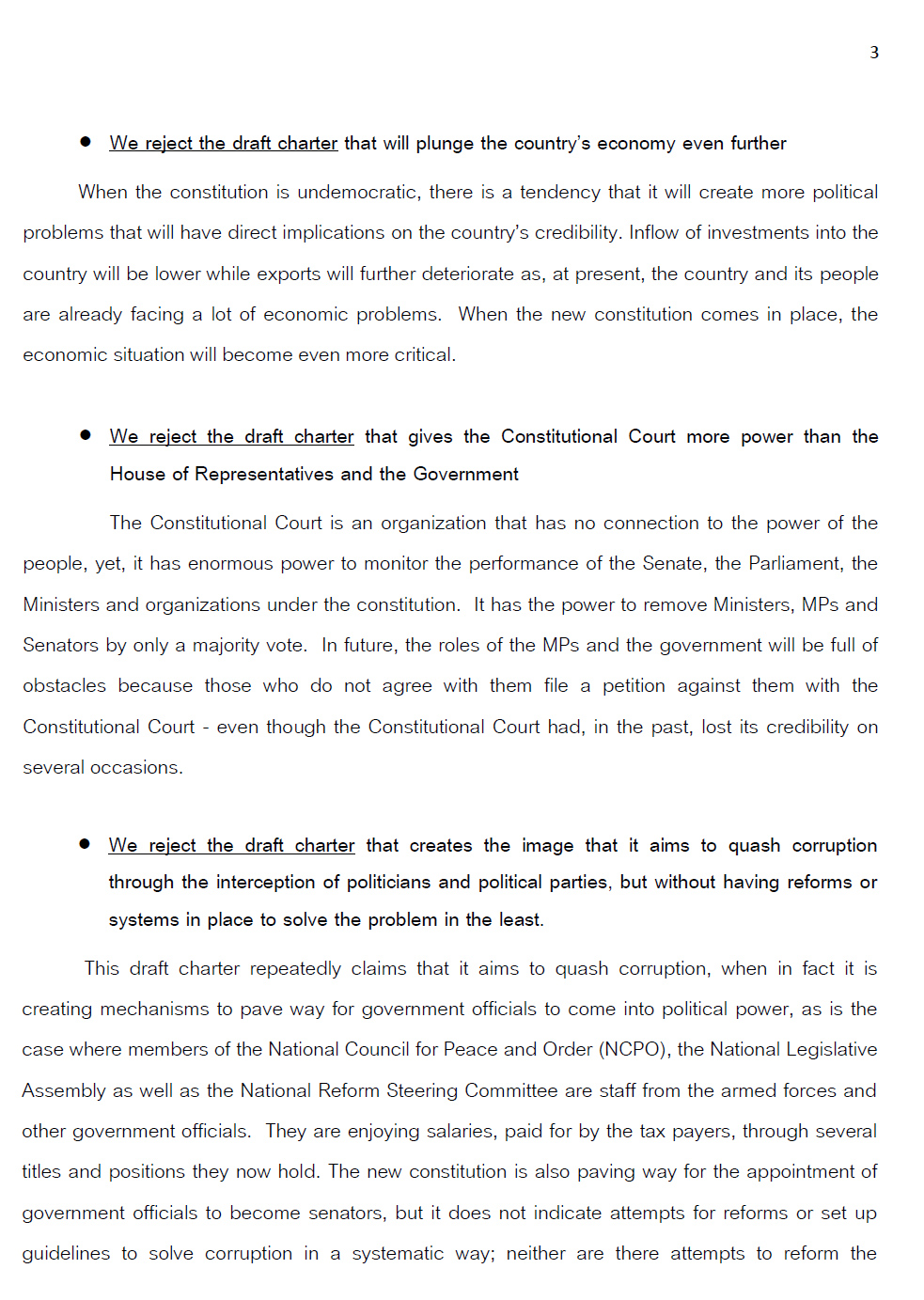
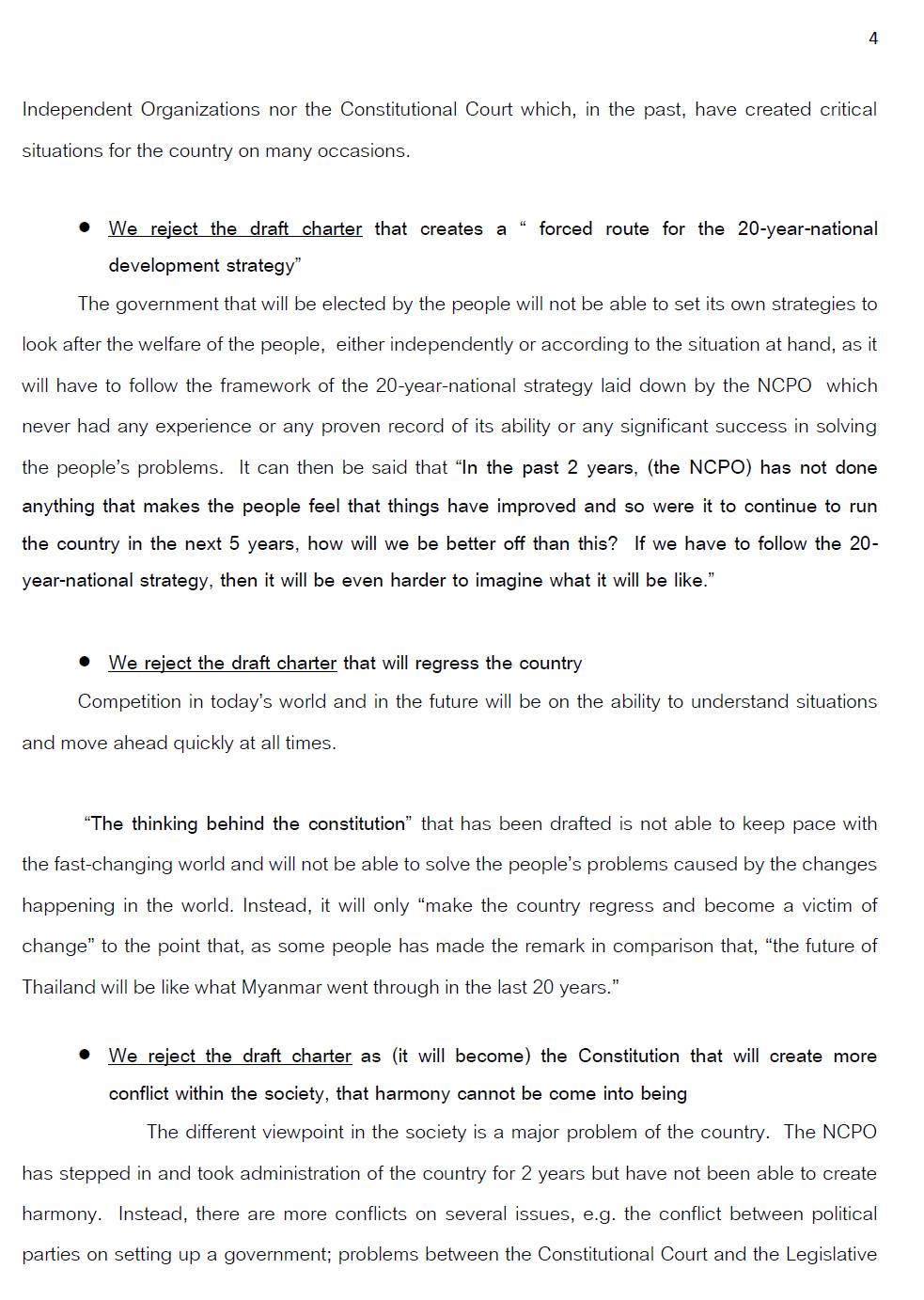
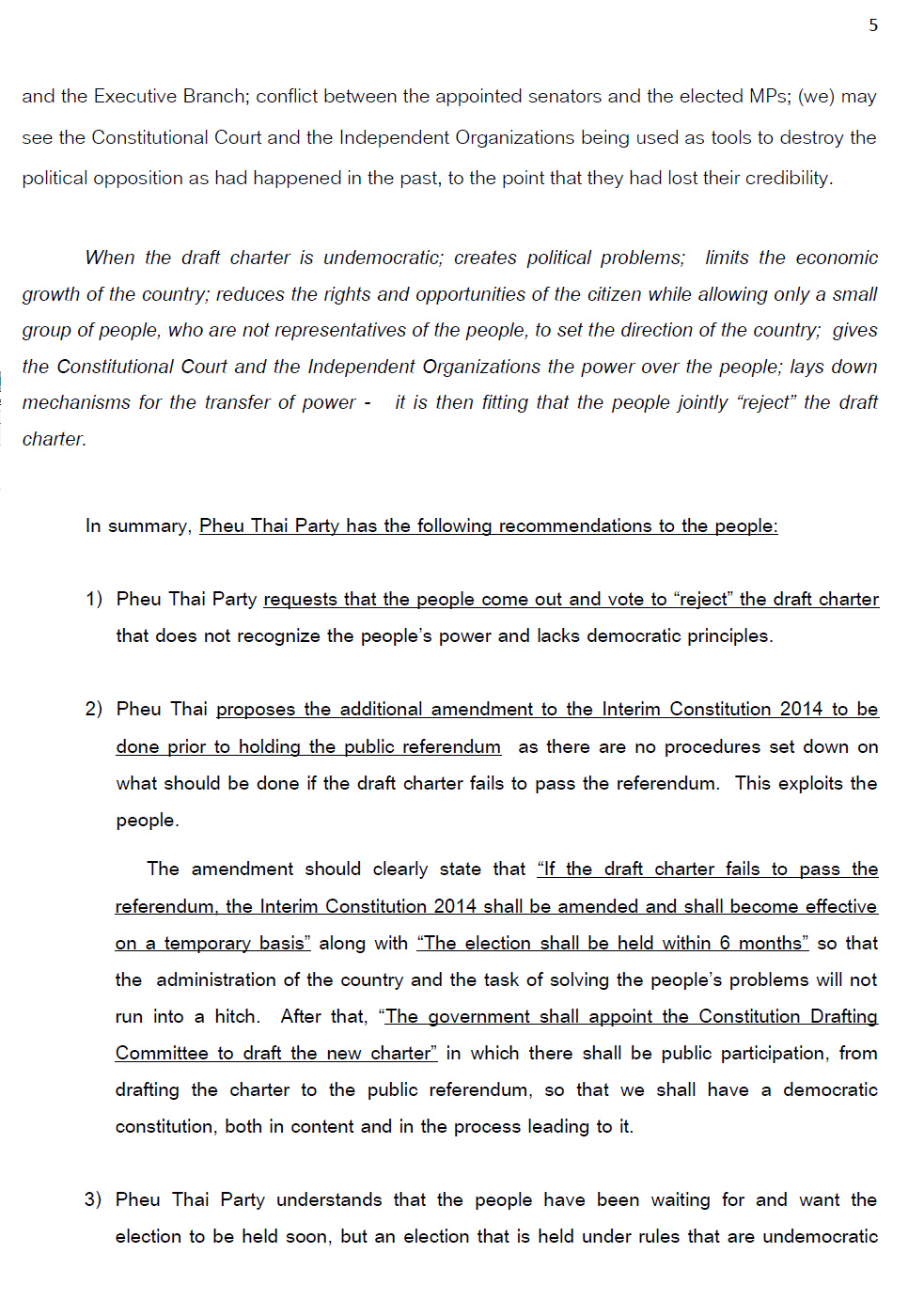
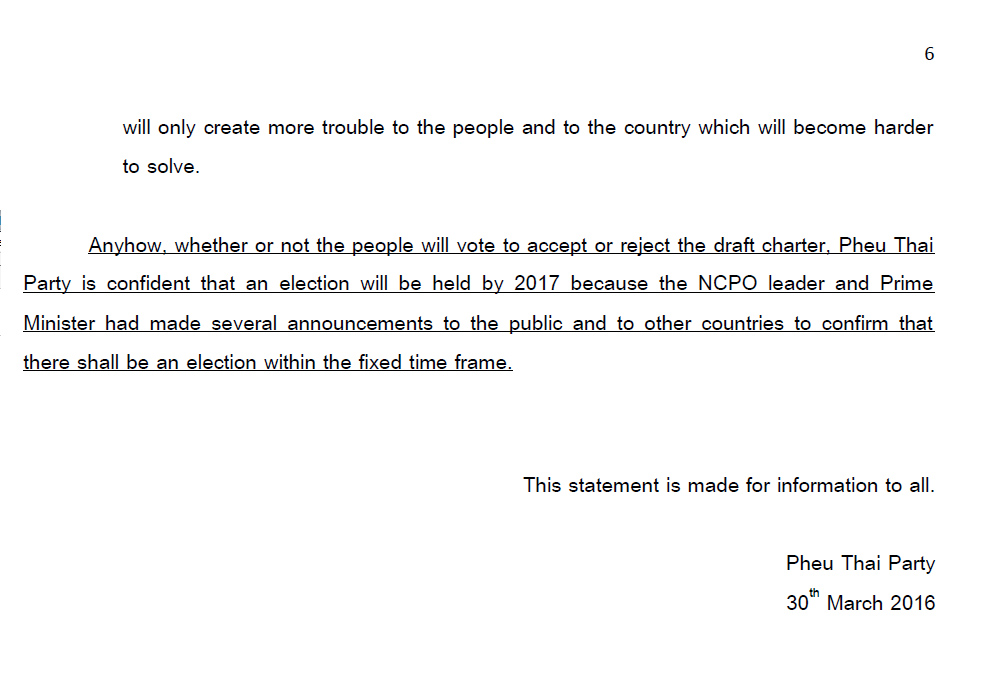
แถลงการณ์พรรคเพื่อไทย
เรื่องไม่รับร่างรัฐธรรมนูญ ที่ไม่ยอมรับอำนาจของประชาชน
ตามที่พรรคเพื่อไทยได้ออกแถลงการณ์แสดงจุดยืนไม่รับร่างรัฐธรรมนูญ เพราะเห็นว่า เป็นร่างฯ ที่ขัดต่อหลักการประชาธิปไตยหลายส่วน และยังจะเป็นเงื่อนไขสำคัญในการสร้างปัญหาให้กับประเทศมากยิ่งขึ้น จึงมีความเห็นว่า ไม่อาจที่จะรับร่างรัฐธรรมนูญฉบับนี้ ได้ด้วยเหตุผลดังนี้
• ไม่รับร่างรัฐธรรมนูญ ที่ประชาชนไม่มีส่วนร่วม
“ระบอบประชาธิปไตย” เป็นระบอบการปกครองที่ถือว่าอำนาจสูงสุดในการปกครองประเทศเป็นของประชาชน เมื่อรัฐธรรมนูญเป็นกติกาสูงสุดซึ่งใช้ในการปกครองประเทศที่ส่งผลโดยตรงต่อชีวิตความเป็นอยู่ของทุกคนในสังคม จึงต้องให้ประชาชนได้มีส่วนร่วมในการยกร่างฯ
แต่ร่างรัฐธรรมนูญฉบับนี้เป็นผลมาจากการรัฐประหารของ คสช. และ คสช. เป็นผู้แต่งตั้งคณะกรรมการยกร่างขึ้นเอง เนื้อหาของร่างรัฐธรรมนูญจึงเป็นไปตามความต้องการของ คสช. เป็นหลักมากกว่าเพื่อประโยชน์ของประชาชน
• ไม่รับร่างรัฐธรรมนูญ ที่จะสร้างปัญหาทางการเมืองให้เพิ่มมากขึ้น
ระบบการเมืองและการเลือกตั้งมีผลโดยตรงต่อการพัฒนาการเมือง เศรษฐกิจและสังคมของประเทศ ถ้าการเมืองมีปัญหา พรรคการเมืองอ่อนแอ รัฐบาลไร้เสถียรภาพก็ไม่อาจที่จะพัฒนาประเทศชาติ และคุณภาพชีวิตของประชาชนให้เจริญก้าวหน้าและอยู่ดีกินดีได้
บทพิสูจน์นี้ยืนยันได้จากรัฐธรรมนูญปี 2540 ที่ประชาชนมีส่วนร่วมมากที่สุด ได้สร้างเสถียรภาพทางการเมือง เศรษฐกิจและความอยู่ดีกินดีของประชาชนเป็นที่ประจักษ์ แต่ร่างรัฐธรรมนูญฉบับนี้ได้สร้างกลไกที่จะนำไปสู่ปัญหาการเมืองหลายประการ เช่น สร้างระบบเลือกตั้งที่ไม่เคยมีใช้ที่ใดในโลก เอาประเทศและประชาชนเป็นตัวประกันเพื่อลองผิดลองถูก ซึ่งระบบนี้จะสร้างให้เกิดรัฐบาลผสมหลายพรรค รัฐบาลไร้เสถียรภาพและประสิทธิภาพในการบริหาร วางกลไกเพื่อเปิดช่องให้บุคคลที่ไม่ได้เป็น ส.ส.มาดำรงตำแหน่งนายกรัฐมนตรี ทั้งที่การเรียกร้องให้นายกฯ มาจาก ส.ส.นั้น กว่าจะได้มาต้องเสียเลือดเสียเนื้อของพี่น้องประชาชนไปเป็นจำนวนมาก ซึ่งระบบเลือกตั้งดังกล่าวประชาชนไม่มีสิทธิในการ “เลือกคนที่รัก” และ “เลือกพรรคที่ชอบ” ได้เหมือนรัฐธรรมนูญปี 2540 และปี 2550 แต่ถูกบังคับให้เลือกทั้งคนและพรรคด้วยบัตรเลือกตั้งใบเดียว นอกจากนี้ยังนำคะแนนของผู้แพ้การเลือกตั้งมาคำนวณเพื่อเพิ่มจำนวน ส.ส.ให้พรรคที่แพ้เลือกตั้ง ขัดหลักประชาธิปไตย ในที่สุดรัฐบาลที่ได้มาจะเป็นรัฐบาลที่อ่อนแอไร้เสถียรภาพและประสิทธิภาพ เกิดปัญหาขัดแย้งกันได้ง่าย อายุรัฐบาลสั้น สูญเสียงบประมาณในการเลือกตั้งบ่อยครั้ง รัฐบาลจะสนใจแต่จะแก้ปัญหาตนเองมากกว่าปัญหาของประชาชน
• ไม่รับร่างรัฐธรรมนูญ ที่อำนาจการปกครองประเทศไม่ได้เป็นของประชาชน โดยประชาชนและเพื่อประชาชนอย่างแท้จริง
ร่างรัฐธรรมนูญฉบับนี้ได้สร้างกลไกที่ลดทอนอำนาจของสภาผู้แทนราษฎรซึ่งเป็นผู้แทนของปวงชน แต่เพิ่มอำนาจให้ ส.ว. ซึ่งมาจากการสรรหา ยิ่งระยะ 5 ปีแรกหลังใช้รัฐธรรมนูญ ส.ว. 250 คนล้วนมีที่มาจาก คสช. ทั้งสิ้น โดยอ้างว่าเพื่อปฏิรูปและวางยุทธศาสตร์ในการพัฒนาประเทศทั้งที่เรื่องดังกล่าวควรเป็นอำนาจหน้าที่ของตัวแทนประชาชน ส.ว. 250 คนจะเป็นกลไกในการยับยั้งกฎหมายของรัฐบาลที่มาจากประชาชน ยังสามารถลงมติร่วมกับ ส.ส. เพื่อเปิดโอกาสให้ผู้ที่มิได้เป็น ส.ส. ดำรงตำแหน่งนายกรัฐมนตรี การปกครองประเทศจึงยังคงเป็นของ คสช.โดยทางอ้อม และหากคนของ คสช. ได้เป็นนายกรัฐมนตรีด้วยก็จะเป็นการควบคุมอำนาจการปกครองแบบเบ็ดเสร็จ ทิศทางของประเทศจึงเป็นไปตามความคิดของ คสช. มากกว่าที่จะเป็นไปตามความต้องการของประชาชนส่วนใหญ่
• ไม่รับร่างรัฐธรรมนูญ ที่จะนำพาเศรษฐกิจของประเทศดิ่งเหวยิ่งขึ้น
เมื่อรัฐธรรมนูญไม่มีความเป็นประชาธิปไตย มีแนวโน้มที่จะสร้างปัญหาทางการเมืองมากขึ้น ย่อมส่งผลกระทบโดยตรงต่อความเชื่อมั่นของต่างประเทศ การลงทุนในประเทศจะลดลง การส่งออก ยิ่งเกิดวิกฤต ทั้งที่ขณะนี้ประเทศและประชาชนก็ประสบปัญหาทางเศรษฐกิจมากอยู่แล้ว หลังใช้รัฐธรรมนูญ วิกฤตทางเศรษฐกิจจะมีมากยิ่งขึ้น
• ไม่รับร่างรัฐธรรมนูญ ที่สร้างให้ศาลรัฐธรรมนูญมีอำนาจเหนือสภาและรัฐบาล
ศาลรัฐธรรมนูญเป็นองค์กรที่ไม่มีความเชื่อมโยงกับอำนาจของประชาชน แต่กลับมีอำนาจมากล้นในการตรวจสอบอำนาจหน้าที่ของสภาผู้แทนราษฎร วุฒิสภา รัฐสภา คณะรัฐมนตรีและองค์กรตามรัฐธรรมนูญ สามารถถอดถอนรัฐมนตรี ส.ส. ส.ว. โดยอาศัยเพียงเสียงข้างมาก ในอนาคตการทำหน้าที่ของ ส.ส. และรัฐบาลจะติดขัดไปหมด เพราะคนที่ไม่พอใจจะไปร้องต่อศาลรัฐธรรมนูญได้โดยง่าย ทั้งที่ผ่านมาศาลรัฐธรรมนูญได้สร้างวิกฤตศรัทธาให้เกิดขึ้นบ่อยครั้ง
• ไม่รับร่างรัฐธรรมนูญ ที่สร้างภาพว่าเพื่อปราบโกง โดยมุ่งสกัดกั้นนักการเมืองและพรรคการเมือง แต่มิได้ปฏิรูปและวางระบบเพื่อแก้ปัญหาฉ้อราษฎรบังหลวงเลยแม้แต่น้อย
ร่างรัฐธรรมนูญฉบับนี้อ้างเสมอว่าเพื่อปราบโกง แต่แท้จริงแล้ว กลับสร้างกลไกให้ข้าราชการประจำเข้ามามีอำนาจทางการเมือง ดังเช่นที่เป็นอยู่ในปัจจุบันที่คนใน คสช. สภานิติบัญญัติแห่งชาติ รัฐบาล รวมทั้งสภาขับเคลื่อนการปฏิรูปประเทศ ก็เป็นข้าราชการในกองทัพและข้าราชการประจำอื่นๆ กินเงินเดือนจากภาษีของประชาชนหลายตำแหน่งหลายทาง และรัฐธรรมนูญที่จะเกิดขึ้นก็เปิดช่องทางให้แต่งตั้งข้าราชการประจำดำรงตำแหน่ง ส.ว. ด้วย ไม่ปรากฏให้เห็นว่าได้มีความพยายามที่จะปฏิรูปและวางแนวทางแก้ไขปัญหาทุจริตอย่างเป็นระบบ ไม่มีการปฏิรูปองค์กรอิสระและศาลรัฐธรรมนูญ ซึ่งที่ผ่านมาได้สร้างวิกฤตให้แก่ชาติหลายครั้ง
• ไม่รับร่างรัฐธรรมนูญ ที่สร้าง “ยุทธศาสตร์บังคับเดิน 20 ปี”
รัฐบาลที่มาจากการตัดสินใจของประชาชนไม่สามารถกำหนดนโยบายในการดูแลชีวิตความเป็นอยู่ของประชาชนได้โดยอิสระ หรือตามสภาพความเป็นจริง เพราะต้องปฏิบัติหรือดำเนินการบริหารบ้านเมืองตามกรอบยุทธศาสตร์ 20 ปีของ คสช. ซึ่งยังไม่เคยมีประสบการณ์ หรือยังไม่เคยพิสูจน์ให้เห็นถึงความสามารถและความสำเร็จในการแก้ไขปัญหาของประชาชนจนเป็นที่ประจักษ์ชัด อาจกล่าวได้ว่า “2 ปีที่ผ่านมา ยังไม่ได้ทำให้ประชาชนรู้สึกว่ามีอะไรดีขึ้น ถ้าจะให้บริหารต่อไปอีก 5 ปี ชีวิตของเราจะดีขึ้นกว่านี้อย่างไร ยิ่งถ้าต้องให้เดินตามต่อไปอีก 20 ปีตามแผนยุทธศาสตร์ นึกไม่ออกจริงๆ ว่า จะเป็นอย่างไร”
• ไม่รับร่างรัฐธรรมนูญ ที่ทำประเทศถอยหลัง
โลกยุคปัจจุบันและอนาคต แข่งขันกันที่ความเร็วและความเท่าทันกับการเปลี่ยนแปลงที่เกิดขึ้นอย่างรวดเร็วและตลอดเวลา
“วิธีคิดตามรัฐธรรมนูญ” ที่จัดทำขึ้น ไม่สามารถตามทันโลกที่กำลังเปลี่ยนแปลงอย่างรวดเร็วและจะไม่สามารถแก้ไขปัญหาของประชาชนได้ทันการเปลี่ยนแปลงที่เกิดขึ้นซึ่งรังแต่จะทำให้ “ประเทศถอยหลังและตกเป็นเหยื่อของการเปลี่ยนแปลง” จนถึงกับมีบางคนกล่าวเปรียบเทียบว่า “อนาคตของไทย คือ อดีตที่ผ่านพ้นมากว่า 20 ปีของพม่า”
• ไม่รับร่างรัฐธรรมนูญ เนื่องจากเป็นรัฐธรรมนูญที่จะสร้างความขัดแย้งให้เพิ่มมากขึ้นในสังคม ความปรองดองก็ไม่อาจเกิดขึ้นได้
ปัญหาความแตกแยกทางความคิดของคนในสังคม เป็นปัญหาใหญ่ของประเทศ รัฐบาล คสช. เข้ามาบริหารประเทศ 2 ปี กลับไม่ได้สร้างความปรองดองให้เกิดขึ้น แต่กลับมีความขัดแย้งเพิ่มขึ้น แทนที่จะใช้รัฐธรรมนูญเป็นเครื่องมือในการแก้ปัญหาดังกล่าว กลับมีกลไกที่สร้างปัญหาความขัดแย้งเพิ่มขึ้นหลายประเด็น เช่น ปัญหาความขัดแย้งระหว่างพรรคการเมืองในการจัดตั้งรัฐบาล ปัญหาระหว่างศาลรัฐธรรมนูญ ฝ่ายนิติบัญญัติและฝ่ายบริหาร ความขัดแย้งระหว่าง ส.ว. ที่มาจากการแต่งตั้งกับสภาผู้แทนราษฎร อาจจะได้เห็นการใช้ศาลรัฐธรรมนูญและองค์กรอิสระเป็นเครื่องมือทำลายล้างฝ่ายตรงข้ามทางการเมืองขึ้นอีกเหมือนเช่นที่ผ่านมา จนเกิดวิกฤตศรัทธาต่อศาลรัฐธรรมนูญและองค์กรอิสระ
เมื่อเป็นร่างรัฐธรรมนูญที่ไม่เป็นประชาธิปไตย สร้างปัญหาทางการเมือง จำกัดโอกาสของประเทศในการเจริญเติบโตทางเศรษฐกิจ ลดทอนสิทธิและโอกาสของประชาชน ให้คนเพียงกลุ่มเดียวกำหนดทิศทางคนทั้งประเทศ ทั้งที่ไม่ใช่ตัวแทนประชาชน สร้างอำนาจให้ศาลรัฐธรรมนูญและองค์กรอิสระ มีอำนาจเหนือตัวแทนของประชาชน วางกลไกให้มีการสืบทอดอำนาจต่อไป จึงสมควรที่ประชาชนจะร่วมกัน “ไม่รับ” ร่างรัฐธรรมนูญ
กล่าวโดยสรุป พรรคเพื่อไทยมีข้อเสนอแนะต่อพี่น้องประชาชน ดังนี้
1) พรรคเพื่อไทย ขอให้พี่น้องประชาชนร่วมกันออกมาลงประชามติ “ไม่รับ” ร่างรัฐธรรมนูญ ที่ไม่ยอมรับอำนาจของประชาชน และขาดความเป็นประชาธิปไตย
2) พรรคเพื่อไทย เสนอให้แก้ไขเพิ่มเติมรัฐธรรมนูญฉบับชั่วคราว 2557 ก่อนการลงประชามติ เนื่องจากไม่ได้กำหนดว่าหากร่างรัฐธรรมนูญไม่ผ่านประชามติแล้วจะดำเนินการอย่างไร อันเป็นการเอาเปรียบประชาชน
โดยให้แก้ไขอย่างชัดเจนว่า “หากร่างรัฐธรรมนูญไม่ผ่านประชามติ ให้นำรัฐธรรมนูญ ฉบับปี 2540 มาปรับแก้และประกาศใช้เป็นการชั่วคราว” พร้อมกับ “จัดให้มีการเลือกตั้งภายในไม่เกิน 6 เดือน” เพื่อให้การบริหารประเทศ และการแก้ไขปัญหาของพี่น้องประชาชน ไม่สะดุด หรือกระทบกระเทือน หลังจากนั้น “ให้รัฐบาลจัดให้มีการตั้งสมาชิกสภาร่างรัฐธรรมนูญเพื่อดำเนินการยกร่างรัฐธรรมนูญฉบับใหม่” โดยให้ประชาชนมีส่วนร่วมตั้งแต่กระบวนการยกร่างจนถึงการให้ความเห็นชอบด้วยการลงประชามติ เพื่อให้ได้รัฐธรรมนูญที่เป็นประชาธิปไตยทั้งในส่วนของเนื้อหาและกระบวนการได้มา
3) พรรคเพื่อไทย เข้าใจถึงการรอคอยของประชาชนที่ต้องการให้มีการเลือกตั้งโดยเร็ว แต่การเลือกตั้งภายใต้กติกาที่ไม่เป็นประชาธิปไตย และสร้างปัญหาในอนาคตนั้น จะสร้างความเดือดร้อนให้กับประชาชนและประเทศชาติจนยากที่จะแก้ไขได้
อย่างไรก็ตาม แม้ประชาชนจะลงประชามติไม่รับร่างรัฐธรรมนูญ พรรคเพื่อไทยมั่นใจว่าจะต้องมีการเลือกตั้งเกิดขึ้นภายในปี 2560 เพราะหัวหน้า คสช. และนายกรัฐมนตรีได้ประกาศไว้ต่อสาธารณชนและนานาประเทศหลายครั้งหลายหน ยืนยันว่าจะต้องมีการเลือกตั้งภายในกำหนดเวลาดังกล่าวอย่างแน่นอน
จึงแถลงมาเพื่อทราบโดยทั่วกัน
พรรคเพื่อไทย
30 มีนาคม 2559
PHEU THAI PARTY STATEMENT On Rejection of the Draft Charter That Does Not
Recognize the Power of the People
Reference is made to Pheu Thai
Party’s statement on its stand to reject the draft charter as it sees that
several parts of the draft charter goes against the democratic principles which
will become important issues that will lead to more problems in the country. Therefore, the Party deems that it cannot
accept this draft charter, based on the following reasons:
·
We reject the draft charter that the does not have public participation
“Democracy”
is a system of governance that upholds the principle that the country’s highest
governing authority belongs to its people.
When the Constitution becomes the highest authority, it will have direct
implications to everyone in that society and, therefore, its people must be
involved in the its drafting.
However,
this draft charter is the result of the coup d’etat by the National Council for
Peace and Order (NCPO) and the NCPO had appointed the Constitution Drafting
Committee, therefore, the content of the draft charter mostly follows the
NCPO’s direction more than it should serve the people’s interest.
·
We reject the draft charter
that creates more problems for the country
The
political and electoral systems will have direct implications on the political
and socio-economic development of the country.
If there are political problems, political parties are weak, the
government is unstable, then the country cannot move forward to improve the
quality of life of its people.
This was proven by the Constitution
of 1997 which had the highest number of public participation and created a
political and economic stability that clearly led to the betterment of the
people’s lives. This draft charter,
however, has mechanisms built into it that will lead to many political flaws,
such as, the creation of an electoral system unlike none other in the world
that will use its people as hostage to test out the effectiveness of the
constitution by trial and error. This
system will lead to a coalition government of several parties; the
government will become unstable and ineffective in running the country; it has
mechanisms that pave way for non-MPs to become Prime Minster, even though the
demands that the Prime Minister must come from the elected Representatives had
been fought and won by the many who had lost their lives to this cause.
Under this
electoral system, the people will not have the right to “choose the people they favor” or “the party
they prefer” as allowed under the Constitution of 1997
and
2007, instead, they will be forced to choose both
the candidates and the parties in one ballot.
Moreover, vote counts for those who lose the election will be used in
the calculation to increase the number of MPs for the party that loses the
election, which goes against the democratic principles. In the end, we will have a government that is
weak, unstable and ineffective and conflicts will arise easily; the government
will be short-lived; there will be loss of budgets due to the many elections
that must be held and the government will be more interested in solving its own
problems rather than those of the people’s.
·
We reject the draft charter
in which the power to govern the country does not fully belong to the people
This
draft charter has created mechanisms that will not only reduce the power of the
MPs, who are the representatives of the people, but will gives more power to the appointed
senators. Especially during the in the
first 5 years transitional period, the
250 senators will all be picked by the NCPO on the pretext that it is to set
reforms and lay down the national development strategies, even though these
matters should be the responsibility of the representatives of the people. The 250 senators will become tools in
deterring laws that are proposed by the government which come from the people. The senators will also be able to vote with
the MPs to pave way for non-elected MPs to become the Prime Minister. Therefore, the administration of the country
will still be, indirectly, under the NCPO and if the a member of the NCPO also
becomes the Prime Minister, then this will be an absolute control of power and
the direction of the country will come from the NCPO rather than from of the majority of the
people.
·
We reject the draft charter
that will plunge the country’s economy even further
When the constitution is undemocratic, there
is a tendency that it will create more political problems that will have direct
implications on the country’s credibility. Inflow of investments into the
country will be lower while exports will further deteriorate as, at present,
the country and its people are already facing a lot of economic problems. When the new constitution comes in place, the
economic situation will become even more critical.
·
We reject the draft charter
that gives the Constitutional Court more power than the House of Representatives
and the Government
The Constitutional Court is an organization
that has no connection to the power of the people, yet, it has enormous power
to monitor the performance of the Senate, the Parliament, the Ministers and
organizations under the constitution. It
has the power to remove Ministers, MPs and Senators by only a majority
vote. In future, the roles of the MPs
and the government will be full of obstacles because those who do not agree
with them file a petition against them with the Constitutional Court – even
though the Constitutional Court had, in the past, lost its credibility on
several occasions.
·
We reject the draft charter
that creates the image that it aims to quash corruption through the
interception of politicians and political parties, but without having reforms
or systems in place to solve the problem in the least.
This draft charter repeatedly claims that it
aims to quash corruption, when in fact it is creating mechanisms to pave way
for government officials to come into political power, as is the case where
members of the National Council for Peace and Order (NCPO), the National
Legislative Assembly as well as the National Reform Steering Committee are
staff from the armed forces and other government officials. They are enjoying salaries, paid for by the
tax payers, through several titles and positions they now hold. The new
constitution is also paving way for the appointment of government officials to
become senators, but it does not indicate attempts for reforms or set up
guidelines to solve corruption in a systematic way; neither are there attempts
to reform the Independent Organizations nor the Constitutional Court which, in
the past, have created critical situations for the country on many occasions.
·
We reject the draft charter
that creates a “ forced route for the 20-year-national development strategy”
The
government that will be elected by the people will not be able to set its own
strategies to look after the welfare of the people, either independently or according to the
situation at hand, as it will have to follow the framework of the
20-year-national strategy laid down by the NCPO
which never had any experience or
any proven record of its ability or any significant success in solving the
people’s problems. It can then be said
that “In the past 2 years, (the NCPO) has not done anything that makes the
people feel that things have improved and so were it to continue to run the
country in the next 5 years, how will we be better off than this? If we have to follow the 20-year-national
strategy, then it will be even harder to imagine what it will be like.”
·
We reject the draft charter
that will regress the country
Competition
in today’s world and in the future will be on the ability to understand
situations and move ahead quickly at all times.
“The thinking
behind the constitution” that has been drafted is not able to keep
pace with the fast-changing world and will not be able to solve the people’s
problems caused by the changes happening in the world. Instead, it will only
“make the country regress and become a victim of change” to the point that, as
some people has made the remark in comparison that, “the future of Thailand
will be like what Myanmar went through in the last 20 years.”
·
We reject the draft charter as
(it will become) the Constitution that will create more conflict within the
society, that harmony cannot be come into being
The different viewpoint in the
society is a major problem of the country.
The NCPO has stepped in and took administration of the country for 2
years but have not been able to create harmony.
Instead, there are more conflicts on several issues, e.g. the conflict
between political parties on setting up a government; problems between the
Constitutional Court and the Legislative and the Executive Branch; conflict
between the appointed senators and the elected MPs; (we) may see the
Constitutional Court and the Independent Organizations being used as tools to
destroy the political opposition as had happened in the past, to the point that
they had lost their credibility.
When the draft
charter is undemocratic; creates political problems; limits the economic growth of the country;
reduces the rights and opportunities of the citizen while allowing only a small
group of people, who are not representatives of the people, to set the direction
of the country; gives the Constitutional
Court and the Independent Organizations the power over the people; lays down
mechanisms for the transfer of power –
it is then fitting that the people jointly “reject” the draft charter.
In summary, Pheu Thai Party has
the following recommendations to the people:
1) Pheu
Thai Party requests that the people come out and vote to “reject” the draft
charter that does not recognize the people’s power and lacks democratic
principles.
2) Pheu
Thai proposes the additional amendment to the Interim Constitution 2014 to
be done prior to holding the public referendum as there are no procedures set down on what
should be done if the draft charter fails to pass the referendum. This exploits the people.
The amendment should clearly state
that “If the draft charter fails to pass the referendum, the Interim
Constitution 2014 shall be amended and shall become effective on a temporary basis”
along with “The election shall be held within 6 months” so that the
administration of the country and the task of solving the people’s
problems will not run into a hitch.
After that, “The government shall appoint the Constitution Drafting
Committee to draft the new charter” in which there shall be public
participation, from drafting the charter to the public referendum, so that we
shall have a democratic constitution, both in content and in the process
leading to it.
3) Pheu
Thai Party understands that the people have been waiting for and want the
election to be held soon, but an election that is held under rules that are
undemocratic will only create more trouble to the people and to the country
which will become harder to solve.
Anyhow,
whether or not the people will vote to accept or reject the draft charter, Pheu
Thai Party is confident that an election will be held by 2017 because the NCPO
leader and Prime Minister had made several announcements to the public and to
other countries to confirm that there shall be an election within the fixed
time frame.
This statement is made for information to
all.
Pheu
Thai Party
30th March 2016
